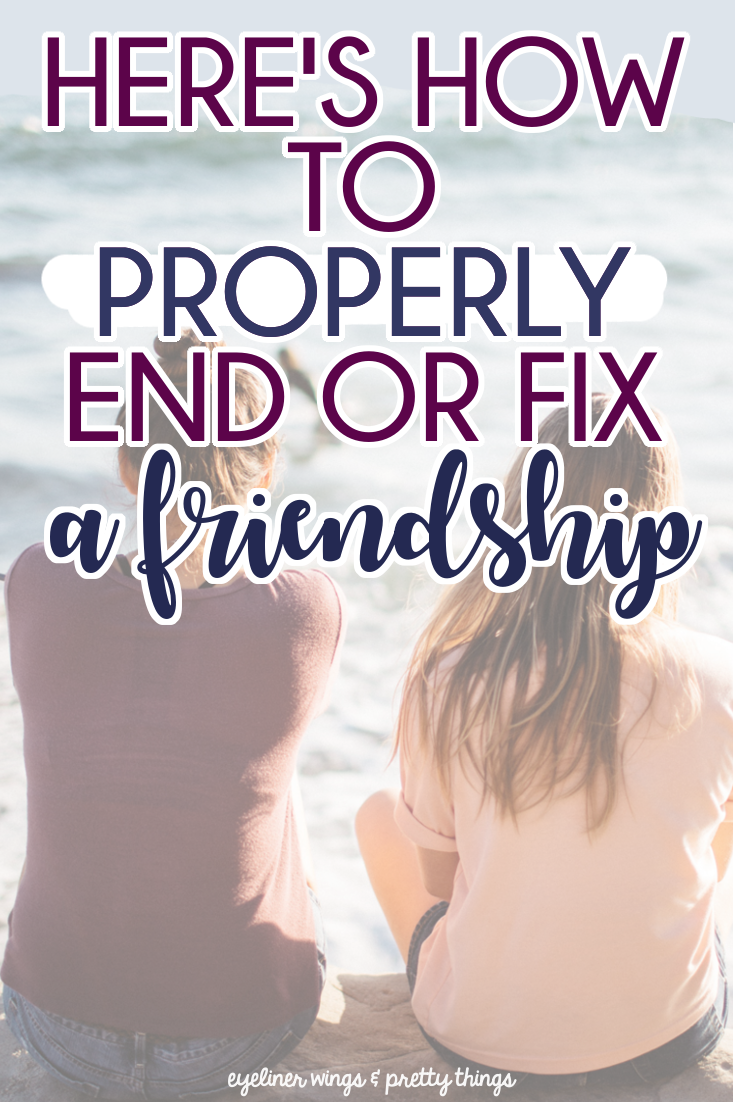
Sometimes you just realize you’ve been spending time with people that are no longer cutting it.
Sometimes your “friend” reveals their true colors… and it turns out you don’t like the colors as much as you thought.
And when you reach the point where you’re questioning the value and validity of a relationship, it could be time to end or a fix a friendship. But other times, your friendship is simply going through a rough patch and it just needs a bit of extra attention.
In some cases, it can be tough to tell. Although I’m no expert, I’ve been through and been a witness of the evaporation of many friendships, good and bad. And this is what I’ve picked up on.
Here’s how to how to tell if perhaps a friendship is worth putting that extra work into, and how to mend it if it is. And here’s how to end that friendship (in the best way possible) if it just is no longer working.
List your grievances about the friendship.
The list can just be for you to dump out your brain and gather your thoughts. Do this on a scrap piece of paper or on a note on your phone. What about this relationship has been bothering you? What has this person done recently that seems to have shown you their true colors?
Then, examine the list.
Are these things fixable? Are they forgivable? Are some of the things you’ve listed things that the person has apologized for or things you thought were resolved? That’s worth looking at, too.
Perhaps you’ll realize these problems aren’t such big problems all. Or, you might discover it’s best for you to move forward and close the book on this particular friendship.
Or, write them a letter.
You don’t have to send it. But, pretending you’re speaking to the person might help you clear your head and figure out what’s really bothering you. It might help you realize if you want to keep this person in your life or are okay with the friendship coming to an end.
Related: How to tell if a friendship is built to last
Decide if you want to bring up your grievances with the person if you feel it could benefit you or the relationship.
Perhaps the person isn’t actually aware that they’re hurting you or that the friendship is on the line. Maybe these are temporary issues. If you believe this friendship is worth keeping and discussing your issues could potentially resolve them, consider planning a time to talk.
Or, even if the friendship isn’t worth keeping maybe you need closure. Perhaps telling the person why the friendship is ending is giving you something you need. If so, go for it.
But, if you truly, deeply feel like the issues are unforgivable and unfixable, it might not be worth having a discussion.
Talk it out, but be level-headed.
Avoid framing this conversation like an intervention or an attack. You’ll want to enter the conversation on a fairly level playing field, so avoid pointing fingers ASAP (even if that’s what you feel you should do). And, you’ll want to focus on the friendship. This shouldn’t be a roast of the individual, but rather a discussion about the state of your friendship in recent weeks, months or however long.
Give the person an opportunity to discuss their own issues with the friendship (if they have any). Remain as calm and collected as possible, but stand your ground. It’s not about blame or trying to fight, it’s about the friendship as a whole and how you’re both functioning within it.
While talking in person is typically the best option, in some cases drafting and sending a text message could be easier. Or, while talking, you can even reference the previous notes you’ve taken.
And, remember, this conversation doesn’t have to be tied up in a bow in an hour. And most friendships and relationships won’t be fixed in a day. But, it’s important to try to walk away from the conversation feeling understood and having a plan both of you can use to move forward. If that’s not the case, it’s up to you if you want to continue trying to discuss your grievances or simply walk away.
Also, the conversation doesn’t need to be a surprise attack. You might want to mention to the person beforehand that you’d like to talk about your friendship. Or, at the very least, try to breach this topic at a location that’s appropriate for a serious talk (a crowded restaurant isn’t a great choice).
Tie up loose ends or accept leaving them untied.
I’m very opposed to ghosting, whether it’s romantic or not. If I have spent a fair amount of time with someone and they decide they’re angry with me or they no longer want me in their life, I would prefer if they just told me straight-up, even if it’s via text. So, I extend that grace to others.
You can, of course, ghost whoever you want. But, if you know loose ends will bother you or constantly leave them wondering, consider saying an official goodbye.
While you may never get answers or closure, you can make a point to definitively put the fork in the friendship so they’re not left wondering if you’re still coming to their birthday dinner or not.
But, if the relationship is on its way to fading out— gradually talking and hanging out less — a ghosting might be appropriate because it’s seemingly mutual. It’s not so much ghosting as it is a gradual fade. Sometimes if a friendship is slowly vanishing (and you’re fine with it), it’s best to take the passive route let it fade rather than attempting to tie it up and shove it in a box. It makes it easier if you want to revisit it someday.
This can also come down to the simple question of whether or not, in the future, you’d be open to revisiting the friendship or not.
Get your advice from unbiased parties… and maybe some biased ones.
They might be able to provide advice or an outsider’s view of the situation. Your friend who’s best friends with the person you’re considering cutting from your life might not be as reliable as someone who is not friends with the person in question. Namely, talk to someone who doesn’t have nearly as much invested in the friendship as you do.
That being said, it can be useful to talk to mutual friends of you and the friend in question. Both can offer a pretty eye-opening perspective. Perhaps that friend can help you to better see both sides of the story.
Take off those rose-colored glasses.
“But they’re so great! But we’ve been friends for 4 years! But, they were there for me when x,y, z happened.”
That may all be true and great, but think about the present. What’s their role in your life now? How has the friendship been lately? How are they treating you?
Over time, I’ve become a firm believer that sometimes people come into your life when you need them. And sometimes they leave at a time that may at first feel wrong, but might be right after all.
While it’s healthy to acknowledge the good this person has brought to your life, remember that it’s in the past. Be thankful for what they’ve done for you, but know when it’s time to move forward. People change and that’s okay.
While I’m not saying to throw a year-long friendship into the trash at the first sign of trouble, it’s important to take note when a friendship is constantly taking more than it gives. As great as your friendship once was, don’t assume it can go back. Sure, it’s worth trying, but try to know when it’s best to close the book and keep that friendship as a fond memory rather than something that weighs on you.
Don’t keep a friendship only because it’s convenient or it’s lasted for a long time.
As I said, those are certainly worth considering when it comes to a friendship. But, it’s not a good reason to stay friends with someone. Remember your worth and remember to value your time— if a friendship is draining your energy and constantly sabotaging your mood, it doesn’t matter if it’s a friendship you’ve had for years. People change, and maybe you both have.
Remember, even if you repair your friendship and move forward… things might not be the same as they always have been.
Consider your friend’s current situation.
While there’s no excuse for being a bad friend, it’s worth considering if anything big is going on in your friend’s life that may have caused the recent rift in your friendship. Maybe they got a new job or are dealing with health issues. Perhaps you moved further away from them and the distance is impacting your relationship. Talk to your friend and consider seeing how you could help, or remind the person that you’re there for them.
Life has ups and downs, and sometimes a friendship isn’t worth ending when it’s in a temporary dip. Put yourself in your friend’s shoes, but remember to care for yourself and don’t feel obligated to stay friends with someone out of guilt.
All in all, use your best judgment.
Only you can decide if a friendship can be repaired or not. It’s not always an easy choice, so remember to put some thought into it and think it over before making up your mind.






